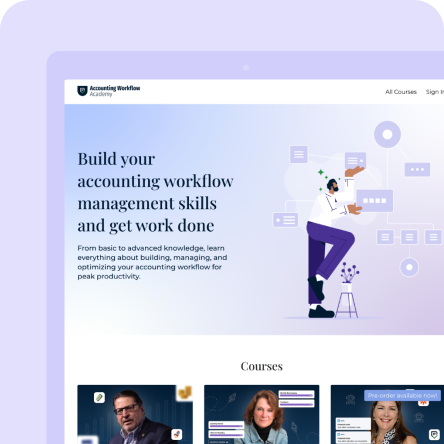The Virtual CFO role has become increasingly popular as businesses seek to retain control over their financial operations while cutting costs. Unlike large companies that can afford to maintain their C-suite team members like the CEO, CMO, and CFO, SMEs cannot afford to do so. Hence, they seek out professionals looking to offer their service part-time and at a reduced fee.
The VCFO role, also known as Outsourced CFO or Fractional CFO, is a variation of the traditional CFO role, with the professional working remotely with different clients and on a part-time basis. Apart from their skills and years of experience, these professionals rely on cloud accounting software to make their work easier and deliver results for their clients.
This piece will unpack what you need to know about the VCFO role with a step-by-step guide on how to begin your journey as one.
Let’s begin!
Who is a Virtual CFO?
A virtual CFO, which stands for Virtual Chief Financial Officer, is a financial professional who handles the role of CFO for a business on a part-time and remote basis. The traditional CFO role oversees financial operations, provides strategic financial advice, and handles financial planning, functions that are also applicable in a VCFO role.
As a VCFO, you can either work one-off for a client on a single project or on an ongoing basis (on a retainer).
The rise of this role has been made possible by:
- Economic downturns which have prompted companies to save costs by hiring contractors.
- Remote work life that has exposed workers to more employment and money-making opportunities beyond their 9-5s and physical environment.
- Cloud technologies leading to the automation of basic tasks, work synchronization, storage, management and collaboration.
What is the difference between a virtual CFO and a CFO?
The following areas differentiate a virtual CFO from a traditional CFO:
Cost/ Pay:
A full-time employment contract does not bind the VCFO, so they work part-time and at a lesser cost. Companies save on office space, equipment, and other employment perks(like paid holidays, leaves, and retirement benefits) by working with a VCFO.
A CFO earns a fixed salary. In the US, the figure is currently pegged at an average of $431,900 annually, according to salary.com.
Schedule:
A virtual CFO is not tied to their client’s conventional 40-hour or more work week style. Instead, since they work with multiple clients on a one-off or retainer basis, they work part-time. On the other hand, a CFO is tied down to one company and dedicates their entire working hours to the company.
Company type:
VCFOs work with Small and medium enterprises to handle financial planning and management. A CFO works with large companies and Fortune 500s to map out and execute the financial vision and work on complex financial tasks like raising capital, conducting mergers and acquisition transactions, etc.
Experience:
A VCFO has a more diverse portfolio and can work for clients in different industries. Since they are binding to one company, CFOs end up as specialized professionals.
If you are interested in becoming a CFO instead. We cover it in detail How to Become a CFO in a separate article. You can read here.
Virtual CFO Services and Responsibilities
The role of a virtual CFO goes beyond pulling the numbers and other basic accounting figures. Instead, there’s a lot of strategic planning and execution to their job. These roles and responsibilities include:
Budgeting and Forecasting
As a VCFO, you are to draw up short-term and long-term plans for a business’s revenue, income, and expenses and make projections about the business’s financial performance over a while. This will help the business with financial planning and business operations and help reduce the chances of the business running at a loss.
Financial and business advice
A VCFO uses the financial data at their disposal to offer guidance to their clients on the kind of business moves to make and financial adjustments to make.
Financial reporting and analysis
A VCFO tracks, compiles, and presents insights on a business’s financials over a while to stakeholders. This will help the business know its financial status and help with better financial planning.
Cash flow management
VCFOs monitor cash inflows and outflows, look for gaps or inconsistencies, address them, and present recommendations to keep revenue flowing and ensure financial stability.
How to Become a Virtual CFO
If you’re ready to begin your journey as a VCFO, you should keep in mind that even if you don’t work in-house or solely for one company, your work is still as critical to a company’s growth, and a company will need you to prove your worth before bringing you on to their team. So, start by evaluating yourself.
List your skills, qualifications, and certifications that will make companies eager to hire you. Most VCFOs have a background in Accounting or business management and at least a master’s degree in related fields. Also, if you already work as a CPA you’re qualified to transition into a VCFO role.
That said, the following tips will help you excel as a VCFO:
Develop Hard and Soft Skills
Some of them are:
- Analytical skills: to make sense of data and uncover business insights.
- Business acumen: to tie your work to the overall business goals.
- Strong communication skills: you should be able to communicate clearly and concisely as you’ll be working virtually with different individuals.
- Critical thinking: to juggle your different tasks as a VCFO and impress your clients with your expertise.
- Collaboration skills: even if it’s not an in-house role, you’ll need to work with other employees in the company to get the right insights and look into the company’s operations.
- Time management: as you may work with different clients in different time zones.
Ensure Software in Your Firm’s Accounting Tech Stack are Cloud-Based
Your ability to thrive in this role also depends on the tools you’ll be working with. Apart from having a working knowledge of different accounting tools and financial techniques, ensure the tools you’ll be working with are cloud-based.
Here’s why.
Cloud-based tools in your tech stack are better for data storage, communication, and collaboration, especially as you’ll work remotely.
Decide on the Virtual CFO Services You’ll Offer
You don’t have to go all in, even as a VCFO, nor do you have to operate like a full-time employee. Since you’re working independently, choose the services you can offer(preferably your strong areas) and pitch them to potential clients.
Price Your Virtual CFO Services
By offering your services as a VCFO to businesses, you’ll be granting them the knowledge, expertise, and access to the network of professionals you’ve built over time in an industry, so factor that in while pricing. Your pricing system should not be based on how long it took you to complete the task.
You may be interested:
How to Offer Your Virtual CFO Services
The following tips can help you launch yourself as a Virtual CFO service provider and get your first gig:
Inform Your Current/Past Clients
Your immediate network should be your first point of call when starting this journey as a VCFO. Inform them of your plan to become a VCFO; they may help you spread the word and give you advice if necessary.
Ask for Testimonials/Referrals
Reach out for feedback and reviews from your past employers and colleagues in previous roles and every new client you work with. Emphasize that the feedback should focus on what you excelled in. This will help you sell specialized services since you have demonstrated and verified expertise.
Don’t hesitate to ask people to refer you to anyone who will need your services, too. When starting out, be willing to offer a discount or a commission for such referrals.
Promote Your Virtual CFO Services through Marketing Channels:
Put yourself on social media, create a website, and launch your email list, or join freelance platforms like Toptal to attract clients. Visibility is key, and you won’t get results if you don’t promote yourself.
Partner with VCFO Firms
You can start this journey by working with any established VCFO firm looking for talent like you. Reach out to some of them, like virtualcfo, and get your first shot at what the role feels like. These firms operate like freelance agencies and still allow you to work independently but take their cut from what clients are willing to pay.
Equip yourself for the VCFO role with Financial Cents
A VCFO role is a form of career advancement as you can use it together with your past experiences to hit a full-time CFO role if that’s your goal. It also allows you to work with more companies and build your portfolio, which will help you negotiate better pay when switching back to a full-time role. Plus, you can move on to creating your own VCFO firm after a while.
Whatever your motivation is, working with the right technology like an accounting CRM software to build strong client relationships will help you transition better and get the best results for your clients.
Begin your journey with Financial Cents by signing up for a 14 Day Free Trial.





